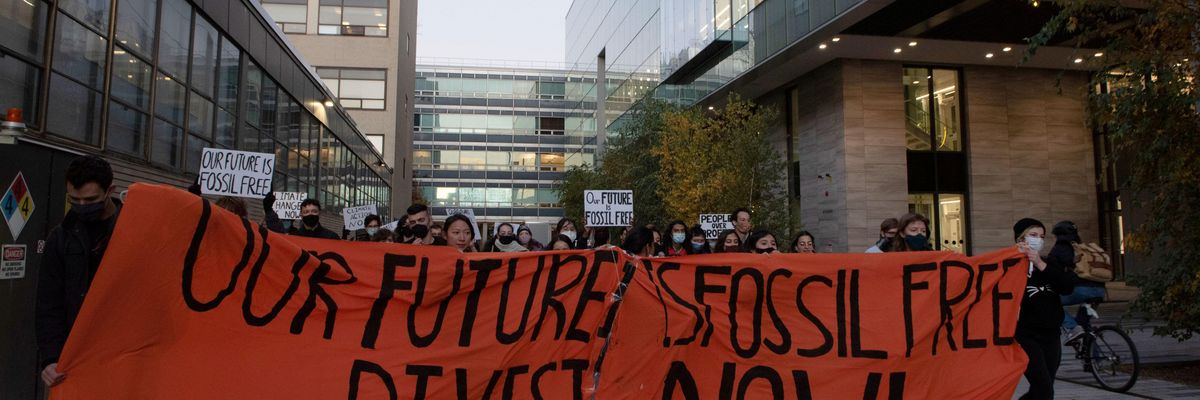Student-led divestment campaigns at five top U.S. universities on Wednesday employed a tactic that has proven effective at a few other schools: They filed legal complaints accusing their institutions of breaking the law by investing in the climate-wrecking fossil fuel industry.
"We are calling on our attorneys general to compel our schools to do the right thing and divest."
With assistance from Climate Defense Project (CDP), students at the Massachusetts Institute of Technology (MIT), Princeton, Stanford, Vanderbilt, and Yale filed complaints with the attorneys general of their states--Massachusetts, New Jersey, California, Tennessee, and Connecticut.
"By filing these complaints, the students and alumni of these institutions are making it clear that our universities have not only a moral responsibility but a legal imperative to cut financial ties with the fossil fuel industry and its exploitative practices," said Miguel Moravec, a Ph.D. student at Vanderbilt, in a statement. "We are calling on our attorneys general to compel our schools to do the right thing and divest."
The students--supported by alumni, campus groups, climate scientists, community members, elected officials, environmental organizations, and professors--accuse their universities of violating the Uniform Prudent Management of Institutional Funds Act (UPMIFA), which is law in every state except Pennsylvania, the District of Columbia, and the U.S. Virgin Islands.
"The law can be a powerful ally in fighting climate change, but only if people are held accountable for actually following it," said CDP staff attorney Alex Marquardt. "Universities have a duty to promote the public interest in exchange for their tax-exempt charitable status, and that duty is incompatible with fossil fuel investments."
Though Yale announced some investment changes last year, students are demanding full divestment from fossil fuels. As student organizer Molly Weiner told The Washington Post: "I'm here studying environmental policy, yet my school is contributing to the climate crisis... It's really awful."
The complaints argue that in addition to flouting the UPMIFA's requirement that nonprofits such as the targeted universities invest with consideration for their "charitable purposes," the schools have also violated their duty of care by investing in "financially risky fossil fuel stocks, which have underperformed for years and are currently at risk of a general collapse in value."
"The legal standards guiding fiduciary conduct are actually quite clear, but they've been underenforced," said CDP's Ted Hamilton. "We're hopeful that attorneys general will take this evidence and hold endowment managers to account when they profit off of immoral business activities."
The students' complaints further highlight potential conflicts of interest. Noting that "across our five schools, our chancellors, board members, trustees, faculty, and donors are financially tied to the fossil fuel industry," Yale student Avery Long asserted it is "unacceptable that our decision-makers are actively profiteering off of climate destruction."
The new filings follow a framework previously used by divestment campaigns at Boston College, Cornell, Harvard, Johns Hopkins, Marquette, and the University of New Mexico. Following campaigners' actions, both Cornell and Harvard committed to divesting from fossil fuels.
Related Content
'The Tide Has Shifted': Harvard to Divest From Fossil Fuels After a Decade of Pressure
Jake Johnson
Organizers at the five new schools--frustrated with how the administrations have responded to their demands--hope the approach will work for them.
"Every time we ask them about fossil fuel divestment, they refer back to other actions that they're taking to make the campus itself greener, such as carbon offsets, but they fail to address actual divestment," Vanderbilt student Aaditi Lele told The Guardian. "A lot of what they do is just greenwashing through mentioning those other actions and then using that as justification to pretend that that's enough."
Princeton graduate Anna Liebowitz said that "in the face of the overwhelming nature of the climate crisis, we look for levers of power and change to which we have access."
"Our universities are amongst the world's wealthiest and most prestigious institutions of higher education, and their investments in the fossil fuel industry--an industry whose actions place the health and future of students and the entire planet at risk--amount to nothing less than complicity in the climate crisis," she continued. "Thus, our campaigns are coming together and collectively calling for an end to fossil fuel investments in higher education and the world at large."
The five schools' endowments collectively represent over $155 billion in assets under management. Pointing out that "in the past decade, 1,485 institutions have publicly committed to at least some form of fossil fuel divestment, representing an unprecedented $39.2 trillion of assets under management," MIT student Ellie Rabenold said "it's time" to follow their lead.
Along with the new filing, student campaigners at MIT launched a sit-in on Wednesday. Jess Cohen, a junior participating in the demonstration, told Common Dreams that "MIT Divest is sitting in starting today outside our president's office in protest of MIT's inaction on climate."
"MIT Divest members filed a legal complaint against our school because we think that MIT deserves better than to remain complicit with what are clearly bad faith actors," Cohen added. "Time and time again, MIT has said that they choose to engage and use that as an excuse to pardon fossil fuel companies and their actions. It is past time that our administration wakes up and takes responsibility."





